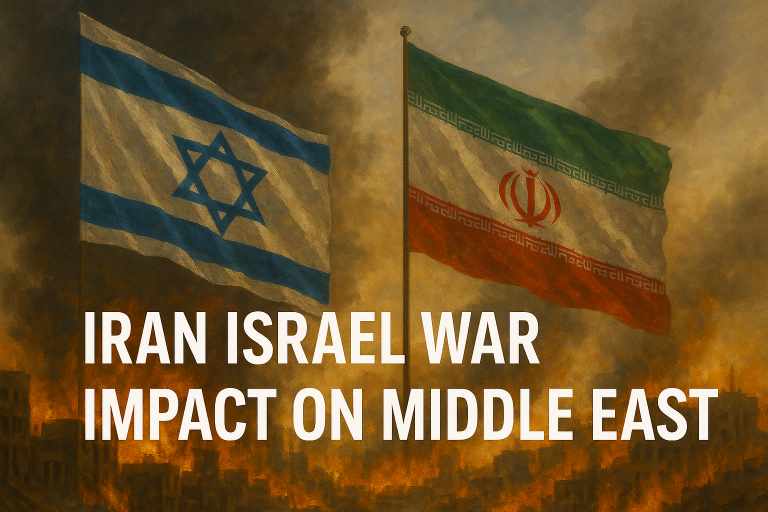The escalating Iran-Israel war, now entering its second week, marks one of the most significant geopolitical confrontations in the Middle East since the U.S. invasion of Iraq. As both countries exchange missile attacks, drone strikes, and covert operations, the broader region stands at a dangerous crossroads. With global powers watching closely and regional alliances being tested, the Iran Israel war impact on Middle East stability, economy, and diplomacy is both immediate and long-term.
The Immediate Effects of the Iran Israel War on Middle East Stability
Military Escalation and Proxy Turmoil
The direct clashes between Iran and Israel have triggered a ripple effect across regional fronts. Iran-backed groups in Lebanon, Syria, and Iraq have intensified their involvement. Hezbollah has launched fresh attacks from southern Lebanon into northern Israel, while pro-Iran militias in Iraq have targeted U.S. military installations.
This escalating military confrontation is destabilizing countries like Syria and Iraq that are already politically fragile. Furthermore, Gulf nations such as Saudi Arabia and the UAE have increased military readiness fearing spillover effects. The fear of miscalculation or accidental escalation is high.
Civilian Displacement and Humanitarian Concerns
Massive displacement has already begun in parts of Lebanon and Iran. The Iranian city of Mashhad, targeted in a retaliatory Israeli airstrike, saw the evacuation of over 50,000 residents. Israel has likewise witnessed mass movement in Tel Aviv and Haifa. The humanitarian burden could overwhelm already strained NGOs and health systems in neighboring countries.
Economic Implications Across the Region
Oil Prices and Energy Supply Shocks
One of the most immediate impacts of the Iran Israel war on Middle East economics has been the rise in global oil prices. Iran has hinted at blocking the Strait of Hormuz, through which over 20% of the world’s oil passes. Brent crude prices have surged past $100 per barrel, with further hikes expected if hostilities persist.
This has implications not only for oil-exporting nations but also for importing countries like Jordan, Lebanon, and even parts of South Asia, including Pakistan and India. The cost of fuel, electricity, and consumer goods is already climbing.
Investor Uncertainty and Market Volatility
Financial markets in the Gulf have seen a drop in investor confidence. Stock exchanges in Riyadh, Dubai, and Doha registered steep falls in the days following the onset of hostilities. International investors fear broader conflict involving U.S. and Russian interests, which could turn the regional war into a global economic crisis.
Political Fallout: Diplomacy Under Pressure
Arab Normalization with Israel Jeopardized
Just months ago, Saudi Arabia was inching closer to formal diplomatic ties with Israel. Now, public opinion across the Arab world is shifting dramatically. Riyadh has paused talks under pressure from both internal clerics and Iranian threats.
In Egypt, Jordan, and even Morocco, protests have erupted demanding a cessation of cooperation with Tel Aviv. The Abraham Accords face their toughest test yet, with nations reconsidering their stance due to the rising death toll and destruction.
U.S. and Russia’s Strategic Calculations
The U.S. has openly supported Israel’s right to defend itself but has urged restraint. Meanwhile, Russia, already entangled in Ukraine, is increasing coordination with Iran, providing satellite intelligence and diplomatic backing.
This has pushed the region into a Cold War–like bipolar environment where any further provocation could involve superpowers directly—either in support of Iran or Israel, thereby globalizing the conflict.
Security Ramifications for the Coming Weeks
Possible Expansion Beyond Borders
There are strong indicators that the conflict may spill into the wider region. Saudi oil installations, Jordanian air bases, and Iraqi ports could become targets. Maritime security in the Red Sea and the Persian Gulf is already compromised, threatening international shipping.
Cyber and Unconventional Warfare
Both nations have a history of cyber-attacks. As the war intensifies, we could see major digital infrastructure disruptions in the Gulf, targeting power grids, banking systems, and air traffic control.
Conclusion: A Region on the Brink
The Iran Israel war impact on Middle East politics and society is vast and unpredictable. With military, economic, and diplomatic tensions reaching new highs, the next few weeks will be crucial in determining whether the region descends into full-scale war or finds a path to de-escalation. Regional and global leaders must act swiftly to prevent a humanitarian and economic catastrophe.
Check More:

